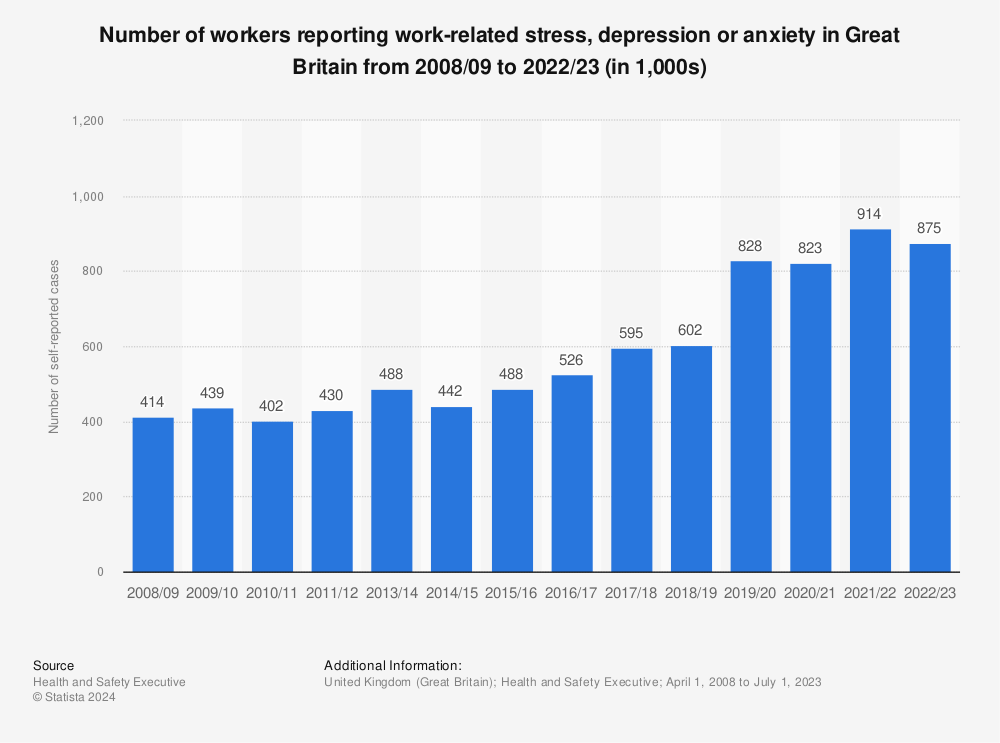How to bring down cortisol levels after a stressful day at work

Getting home after a difficult day at work is always a relief, but we may not be aware that stress can affect us long after we log off.
Any type of stress can result in heightened levels of cortisol in our body. Cortisol is a stress-related hormone released by the adrenal glands that can help control blood pressure, glucose metabolism and reduce inflammation - but too much or too little cortisol can cause health issues.
Too much cortisol can lead to symptoms such as weight gain, acne, fatigue, thinning hair, problems with sleep and indigestion, memory issues, and mental health problems like anxiety and depression.
Being stressed out because of work can cause sleepless nights because cortisol "can disrupt our body’s natural sleep-wake cycle", explains psychologist Dr Becky Spelman.
"This, in turn, leads to difficulty falling asleep, staying asleep, or experiencing restful sleep in general.
"Stress can also contribute to conditions such as insomnia and sleep disorders, further exacerbating the negative effects on our wellbeing."
Watch:Petting Dogs or Cats Can Reduce Stress, Study Says
Drawing the line between work and home
Dr Spelman, who partnered with NEXT for Stress Awareness Month, pointed out that work and home lives have blurred together due to the rise in working from home. However, there are ways you can draw a line between the two and reduce the amount of lingering stress you may feel after work.
"It’s essential to establish boundaries between your work and personal lives, practising mindfulness techniques such as deep breathing or meditation can help with the transition from work to home," she advised.
"If working from home, you should establish a designated workspace, to allow you to recognise a clear differentiation between work life and personal life. I would recommend avoiding working in your bedroom or an area where you tend to relax, if possible.
"Also consider taking regular breaks, exercising throughout the week and getting out of the house on a daily basis for a change of scenery."

Dr Sophie Bostock, resident sleep expert at Bensons for Beds, added that balancing the body’s stress response with an "opposing ‘rest or digest’ or relaxation response" can help reduce cortisol levels after work.
"To flip the switch from stress to relaxation, we have to convince the brain that we are safe and in control," she said. "To do this, we can either focus on relaxing physically or mentally. Our minds and bodies are interconnected, so relaxing our muscles will still relax our minds, and vice versa.
"Relaxation is a skill - the more often you practise, the more quickly and deeply you will be able to relax. It’s a good idea to practise for a few minutes during the day, as well as part of your wind down before bed."
How to create a relaxing bedtime routine
Getting good quality sleep is key to feeling well-rested and ready for the next day. But if stress and high cortisol levels are interfering with your ability to sleep, Dr Spelman suggested paying attention to your sleeping environment.
"I want to stress the importance of creating an inviting sleeping environment with dim lighting, good ventilation and a comfortable mattress. Blackout blinds are great for creating a dark relaxing environment, especially with the longer days," she said.
"It’s also essential to establish a calming bedtime routine, as this is what will set you up for a quality night's sleep. To switch off you should try practising relaxation techniques or gentle stretching whilst avoiding any stimulating activities before bedtime.
"Certain scents, like lavender and chamomile, have been shown to have calming effects on the mind and body, helping us to relax in a soothing environment and improving our quality of sleep."

She added that giving yourself a relaxing self-care routine can help create a sense of calm. "Activities like taking a warm bath, practising mindfulness, or applying a face mask can signal to our bodies that it is time to wind down and prepare for sleep."
Breathing exercises, such as box breathing, and focusing on relaxing images to help your mind and body unwind can also be useful techniques, Dr Bostock advised.
You can also try writing down your thoughts if you can’t get your mind to stop racing when you really want to sleep. Spend 10 to 20 minutes at the end of the workday or right after dinner reflecting on your day and thinking about what you need to do the next day.
"The aim is to stop unnecessary thoughts whirring around your head. If the same thoughts pop into your head when you’ve switched out the light, you can tell yourself that they are on the page, and you don’t need to think about them any more. If any urgent thoughts do come up in bed, keep your notebook and a pencil by your bed so that you can write them down, and then let them go."
Read more about stress:
Anxiety expert explains truth about viral cortisol balancing trend (Yahoo Life UK, 6-min read)
What is 'cortisol belly' and how can reducing stress fix it? (Yahoo Life UK, 4-min read)
This is the most stressful time of day, according to a new poll (Yahoo Life UK, 4-min read)


